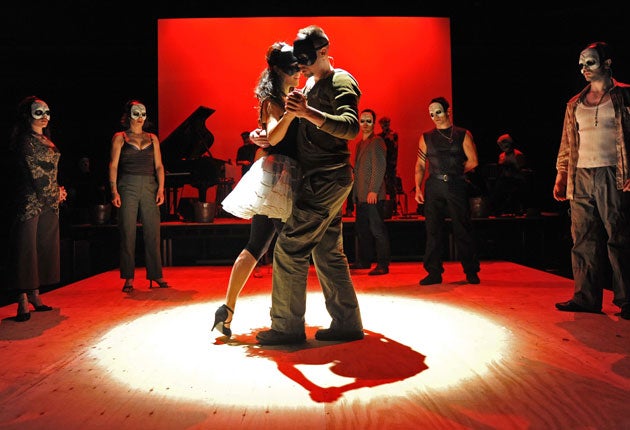Romeo and Juliet, Mercury Theatre, Colchester

Your support helps us to tell the story
From reproductive rights to climate change to Big Tech, The Independent is on the ground when the story is developing. Whether it's investigating the financials of Elon Musk's pro-Trump PAC or producing our latest documentary, 'The A Word', which shines a light on the American women fighting for reproductive rights, we know how important it is to parse out the facts from the messaging.
At such a critical moment in US history, we need reporters on the ground. Your donation allows us to keep sending journalists to speak to both sides of the story.
The Independent is trusted by Americans across the entire political spectrum. And unlike many other quality news outlets, we choose not to lock Americans out of our reporting and analysis with paywalls. We believe quality journalism should be available to everyone, paid for by those who can afford it.
Your support makes all the difference.In Ed Hughes's tango Romeo and Juliet, one of the musicians is caught weeping after Juliet drinks the potion. Pulling himself together – after all, she's not really dead – he beats out a new rhythm, leading the Astillero tango orchestra in a gleeful number. The music stops when Juliet is discovered, her family's grief taking over.
The production has been a labour of love for Hughes, who started planning it while studying tango in Buenos Aires in 2002. His aim is to use tango's passion and danger to drive Shakespeare's starcrossed lovers and warring families. It's a fast-paced, lively show, in modern dress. The international cast appeal directly to the audience, often treating them as the Verona crowd. When Gus Gallagher's Romeo mentions the "fruit-tree tops" of Capulet's orchard, he's clambering through the audience, perching on laps when overcome by the thought of Juliet.
Romeo falls for Maria Victoria Di Pace's Juliet as she dances a demonstration tango with Hughes's Tybalt, torsos upright but legs scissoring. The Capulet group dance is fierce, a demonstration of power as much as a party.
Astillero also play during scenes, which gets distracting in the big speeches. Spoken and musical rhythms clash; even though they're miked, it's hard for the actors to build their own momentum against this insistent soundtrack.
Even so, Gallagher's Romeo has an confident way with verse, matched by vivid physicality. In the balcony scene, he slides beautifully from high-flown ardour to bashful soppiness. Di Pace plays Juliet with bright energy, but she could find more depth in the language.
As Mercutio, Javier Alcina's Queen Mab speech is broken up by the music, though his tango movement is wonderful. He curves and dips, with a constant urge to dance and fight.
The Capulet family are strongly drawn. Ian Pirie's Capulet makes a hefty head of the household. At his most genial, he has a hint of threat, which turns to scary fury when he's thwarted. Shuna Snow plays the Nurse broadly in early scenes, finding a tougher edge as the story gets grimmer.
The musicians of Astillero play small roles throughout. They pop up as chorus, as messengers, as characters who change and define the action. The pianist shuffles the Friar's letters out of sight; it's the orchestra who push the tragedy to its conclusion.
To 13 March (01206 573948)
Join our commenting forum
Join thought-provoking conversations, follow other Independent readers and see their replies
Comments